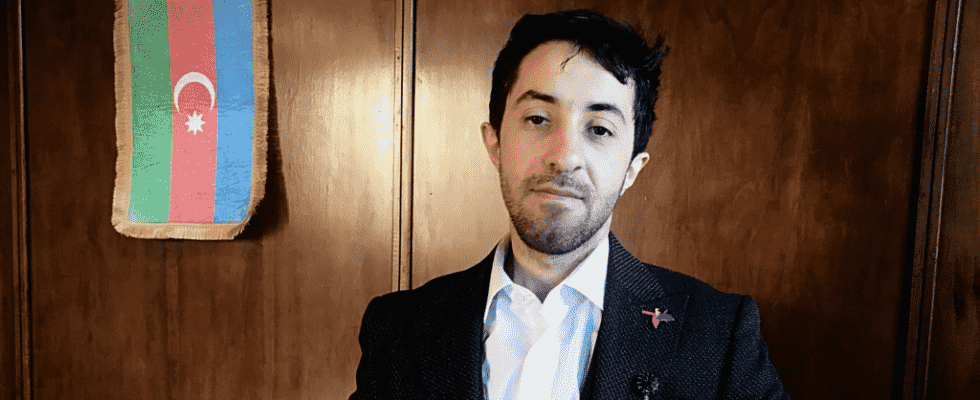On December 26, 1991, the USSR was officially dissolved, the end point of the dislocation of communist regimes in Eastern Europe and part of Central Asia. On the occasion of this thirtieth anniversary, RFI offers you a series of portraits of young people who grew up in the post-Soviet space. What are their aspirations? What do they keep from the heritage of this period? This Monday, direction Turkey, to meet a young Azeri, Elvin.
From our correspondent in Istanbul,
For the past ten years, Elvin Abdurahmanli has lived and studied in Turkey. ” In Europe », Thus, as well as this young man born in 1993 in Chaki, in the north of Azerbaijan, locates his current residence. From the Soviet era, closed two years before his birth, he knows above all what his parents – a father in tourism, a mother librarian – were kind enough to tell him. ” Let’s say that, on the whole, the breakup of the USSR was a good thing », Summarizes this doctoral student in international relations at Istanbul Marmara Public University.
Elvin describes a regime of exploitation of the resources of Azerbaijan (its gas and oil), like its inhabitants. ” The Soviet period was very difficult. For example, we could not freely practice our religion or celebrate our traditional festivals. », Adds the student, citing Ramadan (Azerbaijan is a country with a large Shiite Muslim majority) and the festival of Novrouz, which marks the arrival of spring.
He proudly points out that he only knew Azerbaijan as an independent state. ” But we had already tasted independence in 1918 », He hastens to add, evoking the ephemeral Democratic Republic of Azerbaijan (1918-1920), whose experience was cut short with the intervention of the Red Army. ” From there, the USSR only weakened us. And not just us… Kazakhstan, Uzbekistan, Turkmenistan and many others “, He sighs, listing some countries he feels close to today,” from a cultural point of view “.
A dark legacy
In the Soviet era, Elvin also associated violence ” from beginning to end – her parents told her their memories of “Black January”, those bloody days of clashes with Soviet forces in Baku in January 1990 – the permanent suspicion, internalized fear, generalized corruption. “ My parents couldn’t study, get together with their friends, get information, travel freely », He denounces.
From these stories, the young Azeri drew a deep distrust of the Russian neighbor. A mistrust all the more entrenched as it is, according to him, reciprocal. ” I have only been to Russia once », He specifies. ” Upon arrival, I was asked a lot of questions: are you from Azerbaijan? What are you doing in Turkey? Why are you studying these subjects? Some things haven’t changed much. “
Unmissable Russia
Despite everything, Elvin knows that Russia is inescapable. ” We must maintain a diplomatic balance. Russia must never see Azerbaijan as its backyard again “, Underlines this young man who confides to speak very little Russian, in spite of the obligatory courses at the school,” because my parents have always made it a point of honor to speak our language “. He is following developments in the region with concern. ” It is clear that the Russian Federation considers certain states of the Caucasus as belonging to it… Look at Georgia, look at Crimea. In my eyes it was an invasion of Ukraine. “
Elvin believes that Azerbaijan has ” no major problem with the former Soviet bloc countries … except, of course, from Armenia “. When he describes the fall 2020 clashes in the Nagorno-Karabakh, he does not speak of ” war “, corn ” military operation “. ” This region is ours, we had all the rights to take it back and we will protect it to the end. », He launches, raising his voice.
The young man is grateful to Turkey for supporting his country against the Armenian forces, providing it with military advice and combat drones. But his attachment is much older. “ I grew up watching Turkish movies », Smiles this perfect Turkic speaker, arrived in the country of Recep Tayyip Erdogan in 2011, at the age of 18, after having completed all his schooling in Baku. ” I was accepted to universities in Germany and the United States, but it was too expensive. Turkey was much more affordable, while still providing a decent quality education », Explains the doctoral student.
In Istanbul, Elvin chairs an NGO supporting young Azeris in the city. He never had to suffer from administrative delays. ” When you say you are from Azerbaijan, you are getting special treatment in Turkey. I have not known this anywhere else », He greets. He dreams of the future in the service of his native country: ” I hope to become a diplomat to represent Azerbaijan, if possible in Turkey. “
► To read also:
► On RFI Connaissances:
